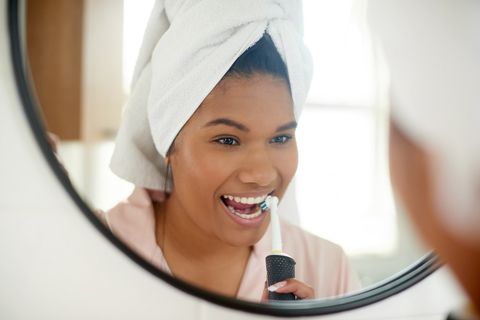Good oral hygiene involves adhering to a regular cleaning regimen as well as using correct techniques when cleaning your smile. It also involves a combination of practices you complete at home and visiting your dentist for routine care. With proper oral hygiene, you can maintain a healthy and beautiful smile.
Neglecting any of these oral hygiene steps might put your dental health in danger. Your teeth may weaken, making them susceptible to many types of oral health problems.
When you know what happens during both at-home and in-office oral hygiene regimens, you can better stick to a proper teeth-cleaning schedule and enhance your overall oral health. Learn details about the differences between your own oral hygiene practices and how your dentist cleans your teeth when you read on.

How Do You Keep Your Smile Clean at Home?
Keeping your smile in good shape involves taking steps to care for it every day. You must brush your teeth at least twice per day in the mornings and evenings.
If possible, use an electric toothbrush which can remove more residues from your teeth than a manual one will. Consistent, thorough teeth brushing will scrub away food particles and plaque that collect on your smile and might otherwise threaten your dental health.
At-home oral hygiene also requires daily flossing. This action will remove plaque that accrues between the teeth that your toothbrush cannot reach on its own. Traditional string floss will work well for this task. But some patients might benefit from alternative flossers like floss picks or a water flosser.
You may also want to try other tools that can enhance at-home oral hygiene. Mouthwash or a tongue scraper can give oral cleanliness a boost. Consult with your dentist for more advice about how to maximize oral hygiene.
What Happens During a Professional Teeth Cleaning?
A professional dental cleaning begins with rinsing your smile with mouthwash to get rid of easy, lingering particles in your smile. Then the dentist will use a scaler to scrape away stubborn plaque and tartar that your toothbrush cannot remove. They especially target the gumline that commonly collects build-up.
The dentist will then use a special brush and paste to scrub and polish your teeth. They finish the process by flossing between your teeth. This specialized cleaning regimen will get rid of build-up that you cannot handle on your own.
A dentist can employ equipment that will provide a more thorough cleaning than your at-home tools can accomplish. And they can see potential problem areas and address them. This professional-grade cleaning, in conjunction, with your own oral hygiene efforts, will allow your teeth to stay strong enough to resist tooth decay, dental stains, and other dental concerns.
For best results, attend these dental check-ups at least twice per year. Your dentist can tell you more about the preventive care that your unique smile needs when you give the office a call.
